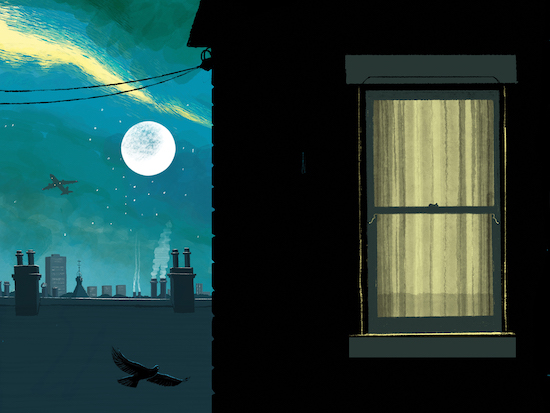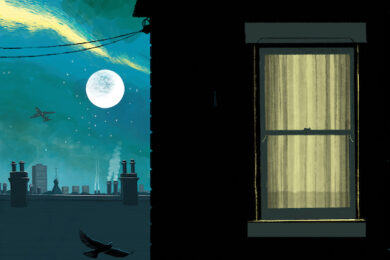Image credit: Frances Castle, Claypipe Music
Robert Barry is reading Hot Milk by Deborah Levy
Last night, in bed, I paused in my reading to copy down into my notebook the following exchange:
‘Why is nothing interesting?’
‘Because it covers up everything.’
It comes just over one hundred pages into Deborah Levy’s 2016 novel Hot Milk. At this point, frankly, I’m not sure what it was that so struck me about these lines of dialogue, but evidently in the half-light, half-asleep, half-drunk state of two am Saturday night (we had been out) it seemed evocative of… something.
There are currently two types of books that I read. There are the books that I read for work and for research or as prep for the class I teach on Tuesday mornings. These are the daytime books. I read them on the sofa or on the bus or on the tube or in the British Library. They arrive in the post and accumulate in teetering tenement blocks on more or less every raised surface in the flat or they are searched for online and downloaded and scrolled through on the screen of my phone or they are ordered to be collected, seventy minutes or forty-eight hours later, at my designated reading room at the British Library.
And then there are the books at bedtime, the books I read just for myself, which are always – or almost always – novels and always actual paper books and which never really leave the little bedside table in my room. In a vain attempt to stem the paperback metropolis sprawling across my apartment, these books are invariably chosen from my local public library. I lose hours drifting through the stacks without purpose, accumulating piles of books that get hoarded, guiltily, for weeks.
At the moment, my nights are absorbed in Hot Milk. It has a tender mystery that is uniquely seductive. I’m not quite sure yet who will turn out to be the mad one. Maybe everyone. But almost equally intriguing are the little yellow post-it notes I keep finding between the pages, left there, presumably, by a previous borrower. They are each written in a near Chinese script. I have no idea what they say. Précis of the plot so far, perhaps, or notes on unfamiliar words. I find a new one every chapter or so, and dutifully unstick it from the page and tuck it between the last page and back cover. I have come to develop a strange curiosity about the author of these notes. Part of me wants to get them all translated, to see if I could reconstruct Levy’s novel from them – or perhaps find the beginnings of another story entirely.
Lara C. Cory is reading From the Depths and Other Strange Tales of the Sea edited by Mike Ashley
On a recent trip abroad, the man sitting next to me on the plane was reading From the Depths and Other Strange Tales of the Sea and it felt like an omen. Because what comes next in my bedtime reading list seems dictated mostly by mood, destiny and a belief that I was a sailor in a past life. Howard Pyle’s Book of Pirates is a permanent fixture on my bedside table, and it’s been accompanied by everything from Atlantic by Simon Winchester to Conrad Aiken’s Blue Voyage and any number of Lovecraft shorts.
I love everything about this book from the inky black and blue cover to the small but excellent introductions for each story provided by editor Mike Ashley. Ashley is an expert on popular fiction of the nineteenth and twentieth century and has put together a series of short-story collections for the British Library Publishing imprint that focus on lesser-known authors and stories.
From the Depths features fifteen tales of mystery and adventure on the high seas, part of a literary tradition that’s been popular since Coleridge’s Rime of the Ancient Mariner. This collection gets to the heart of maritime romance, with stories that explore the fascination of the Sargasso Sea and its deadly swathes of seaweed-infested waters and tentacled sea-monsters, ghost ships that continue to sail and wreak havoc long-after the crew has disappeared, stories of revenge and disaster, and perhaps my favourite of all, ‘No Ships Pass’ by Lady Eleanor Smith, first published in Cassell’s Magazine in 1932. An active member of the Bright Young Things, Lady Smith’s personal life only adds to the allure of this story about a castaway, Patterson, who finds himself marooned on a mysterious tropical island with a simple-minded dwarf, Heyward, Dicky Judd, who survived the Titanic, and the sadistic Spanish pirate, Captain Thunder, and his prisoner turned mistress, Dona Ines.
Ashley speculates that this tall tale might be the inspiration for the Lost TV series, and it’s my feeling that the invisible sea monster of Ward Muir’s Sargasso could have provided the seed for an episode of The X Files.
Frances Castle is reading Sabrina by Nick Drnaso
I live in a small London flat and don’t have a bedside table – there just isn’t the space. Instead I keep a pile of books, magazines and an old iPad piled up on the floor close at hand. Occasionally the pile topples over, or the wardrobe door knocks into it and, books slide under the bed and get forgotten for a while.
I tend to read at night when my partner is asleep, for this I recently got a little USB light attachment that clips onto a book. It actually works quite well, casting a blueish white light on to the page, and means I can read into the night when I should probably be sleeping. The iPad of course is perfect for reading in the dark. I have an account with Readily which means I read more magazines than I ever did. I’ll read pretty much anything music related, all the glossy music magazines and the ones relating to tech, I like to read about new synthesizers, plugins and musical gadgets.
Proper paper magazines, that are part of the pile are Illustration, Pressing Matters (a printmaking magazine) and Electronic Sound. I have to admit to having some unfinished books on this pile that occasionally I’ll pick up. Inspecting it this morning I found Nick Drnaso’s graphic novel Sabrina – I’m more than three quarters of the way through it. it”s beautifully done, but I’ve found it a tough read. It’s very bleak, the flat drawing style fitting the banal suburban America where the book is set. A girl is missing, then discovered murdered, and the story follows not only the effect the death has on her friends and family, but also how it is reported online, the untruths and ‘fake news’ that twist what happened. It’s quite an overwhelming and thought-provoking read.
Another half finished book is Roland Camberton’s Scamp, the recent reprint, with the great John Minton cover. It’s a period piece, depicting a post-war bohemian London that is all but lost. I’m not sure what made me put it down, how it slipped to the bottom of the pile. I think because perhaps I felt that Patrick Hamilton just did it better, but I do want to finish it. I also have Camberton’s second book Rain on the Pavements (also with a Minton cover) that I’m still to start.



